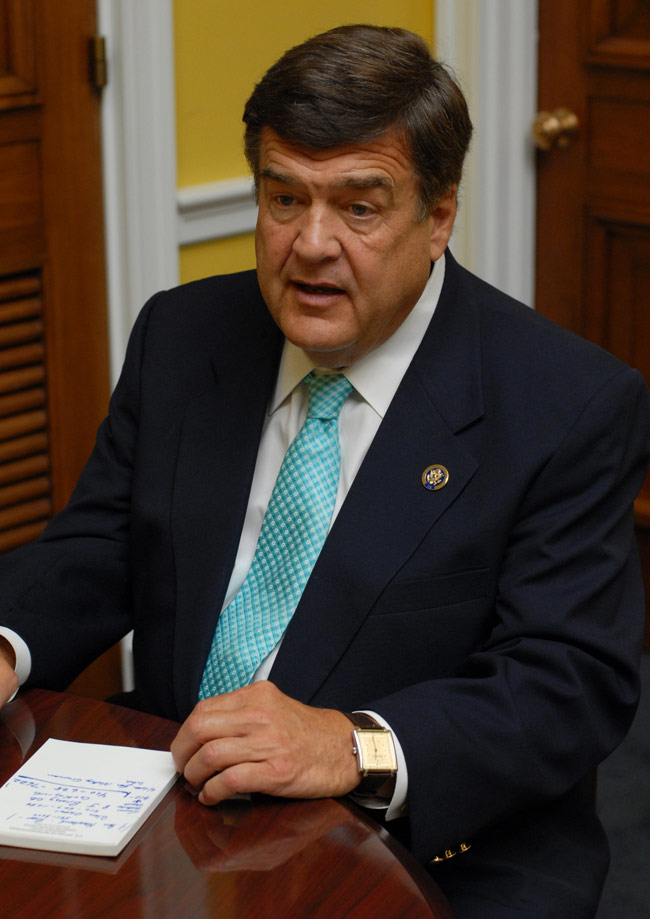“One of the leading factors for violent injury is prior injury,” one of the bill’s sponsors, Rep. Dutch Ruppersberger, D- Timonium, said. “If we can help victims of violent injury before they become repeat victims or ever perpetrators themselves, we end the cycle and net cost savings to the American taxpayer.”
Ruppersberger and Rep. Adam Kinzinger, R-Illinois, introduced legislation that would provide close to $10 million through federal grants to help hospitals expand or create programs to help patients who are recovering from injuries caused by violent crime. It is similar to legislation the pair sponsored in the last Congress and was passed in the House.
Expenses ranging from police, courts, jails, and medical costs to the lost wages from victims and perpetrators cost taxpayers across the country more than $42 billion annually, Ruppersberger said.
The bill takes inspiration from the model currently employed at the University of Maryland Shock Trauma Center in Baltimore, which gives participants counseling and a full range of support, including money for public transportation, substance abuse treatment, job training, and affordable housing.
Ruppersberger said close to 20 percent of all patients at the center are victims of violence in Baltimore, such as stabbings or shootings.
Kinzinger said mental health issues are rising across the country along with acts of violence, and victims are often caught in an ensuing cycle of violence. He said this legislation provides the opportunity to support victims with the education and resources to pursue a different path.
“Right now, it’s important we work together to help and heal those who are struggling,” he said. “The Bipartisan Solution to Cyclical Violence Act is a perfect example of how we can join forces and enact policies that will have a real and lasting impact in our communities.”
Ruppersberger said that patients who participated in the Baltimore program saw an 83% decrease in re-hospitalization due to intentional violent injury, 75% decrease in criminal activity and an 82% rise in employment following completion.
The legislation has been endorsed by numerous organizations, including the American College of Surgeons.
The college’s executive director, Dr. David Hoyt, said that violence is a public health crisis that disproportionately affects the nation’s most vulnerable citizens and contributes to health disparities across the country.
“Violence prevention services have been shown to improve patients’ recovery and decrease the risk of re-injury,” Hoyt said. “(Hospital-based violence intervention programs) have demonstrated success and value by mitigating the risk factors associated with violence and significantly reducing violent injury recidivism.”
President Joe Biden’s proposed jobs and infrastructure plan offers over $5 billion to support community-based violence prevention programs, although the allocation of the funding is not yet finalized.
White House Domestic Policy Council Director Susan Rice told NPR on April 1 that the administration decided to raise funding for violence prevention programs to help communities that have been struggling for years without the necessary resources.
“The epidemic of violence, in our cities particularly, is horrific and growing,” she said.
The money is included in the infrastructure plan because the goal of the package is to make sure Americans have the infrastructure to compete and succeed, Rice said.
If passed, the legislation proposed by Ruppersberger and Kinzinger would require the health and human services secretary to choose the hospitals for the federal grants among existing and potential violence prevention programs. After three years, those hospitals would report their findings to the federal government.
The legislation is awaiting a hearing before the House Committee on Energy and Commerce.
“This bill is also critical to our efforts to shift social work away from police and first responders, and back to the experts in mental health, substance abuse, homelessness, unemployment and other areas that often afflict victims of violent crime,” Ruppersberger said.






Recent Comments